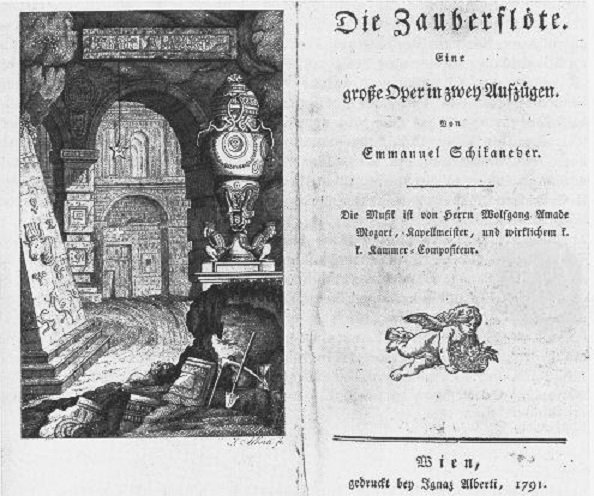Singspiel in two acts premiered at the Freihaustheater auf der Wieden on 30 September 1791. Firmly situated in the context of Viennese suburban comedy and sung theatre, and not-so-subtly referencing Masonic practices and beliefs, the work was one of Mozart’s greatest successes. On 14 October 1791, the composer wrote to his wife, Constanze, telling her of the reactions of Antonio Salieri and the singer Caterina Cavalieri, whom he had taken to see the work:
- You cannot believe how polite they both were, ‑‑ how much they liked not only my music, but the libretto and everything. They both said that it was an operone [a grand opera], worthy to be performed for the grandest festival and before the greatest monarch, and that they would often go to see it, as they had never seen a more beautiful or delightful show. He listened and watched most attentively and from the overture to the last chorus there was not a single number that did not call forth from him a bravo! or bello!
Contemporaneous newspapers were similarly full of praise for the music, even if the libretto was sometimes said to be substandard. The Staats- und gelehrte Zeitung des hamburgischen unpartheyischen Correspondenten for 4 October reported that ‘Herr Mozart has composed a new opera, Die Egyptische Geheimnisse, which is one of the most excellent compositions of this outstanding artist.’ And on 14 October the same newspaper noted that ‘Some days ago a new machine comedy called Die Zauberflöte was performed at the theatre here [in Vienna]. . . the music is by the famous Kapellmeister Mozart. For this reason, and because of the marvelous sets, the piece would have won universal approval if only the text had also met the minimum expectations.’ The designation ‘machine comedy’ refers to the opera’s numerous staging and scenic effects, including the descent of the Three Genii in a balloon at the start of the first act finale, presumably a topical reference to Jean-Pierre Blanchard's balloon flight in Vienna in July 1791.

W. A. Mozart, Die Zauberflote, libretto frontispiece (Vienna, 1791)
- Category/Role
- Opera
- Author/Creator
- Mozart, Wolfgang Amadeus (1756-1791)
- Date 1
- 1791
- Date 2
- 1791-09-30
- Location
- Vienna
- Sub-location
- Theater auf der Wieden